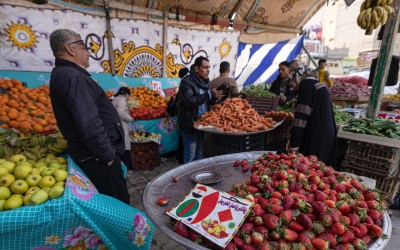Israel recognition opposed by vast majority in Arab world, says major poll

The vast majority of Arabs continue to oppose establishing diplomatic ties with Israel two years after countries in the region signed recognition agreements, an annual survey has revealed.
The 2022 Arab Opinion Index, a survey of 33,300 individual respondents in 14 Arab countries, showed only very small percentages sympathetic to their country establishing relations with Israel.
The highest support was in Morocco, which established relations in December 2020 as part of a US-brokered deal, with 20 percent of respondents saying they supported recognition.
The lowest support was in Algeria and Mauritania, with 0 and 1 percent respectively supporting recognition.
Israel also topped the poll as the regional country most threatening to the respondents' home country, peaking at 79 percent for Palestinians and 53 percent for Lebanese. For Iraqis, Iran was seen as the most dangerous, followed by Turkey.
The US was the second-most threatening country for most respondents.
Despite the widespread opposition to Israeli recognition, only 1.5 percent said the Israeli occupation was the most pressing issue facing their region.
Inflation and the cost of living came top of respondents' concerns, followed by "negative economic conditions" and unemployment.
A majority of people in Qatar, Saudi Arabia, Algeria and Kuwait described the economic situation in their countries as "positive" while virtually no-one in Lebanon said the same.
A majority of people in all regions except the Gulf said their country was heading in the wrong direction, with the highest percentage, 84, in the Levant (Lebanon, Syria, Jordan and Iraq) agreeing.
Much of the region has been hit by economic crisis as a result of the Covid-19 pandemic and Russia's invasion of Ukraine.
Ukraine was a crucial source of food for much of the Arab world, which is heavily dependent on imports.
Middle East Eye propose une couverture et une analyse indépendantes et incomparables du Moyen-Orient, de l’Afrique du Nord et d’autres régions du monde. Pour en savoir plus sur la reprise de ce contenu et les frais qui s’appliquent, veuillez remplir ce formulaire [en anglais]. Pour en savoir plus sur MEE, cliquez ici [en anglais].





